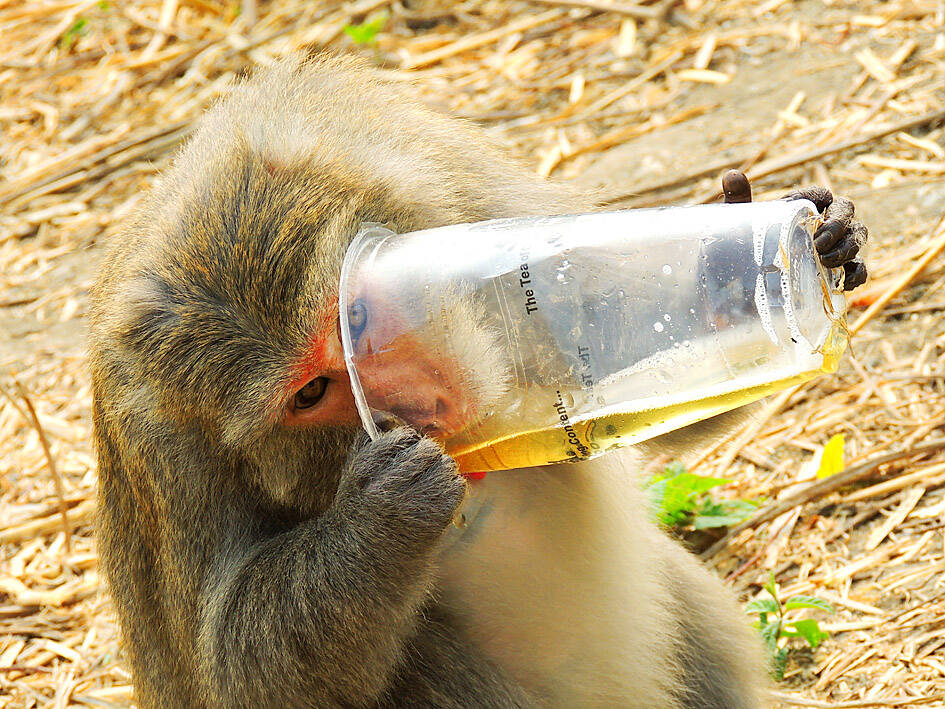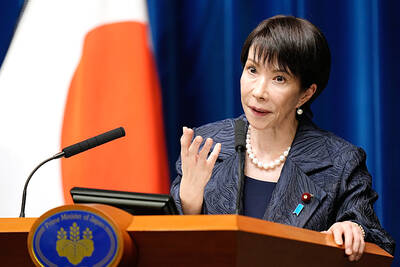Increased contact between humans and Formosan macaques in the Shoushan (壽山) area of Kaohsiung’s Gushan District (鼓山) might be increasing the risk of life-threatening diseases jumping species, a National Pingtung University of Science and Technology report said.
The report was commissioned by the Ministry of the Interior’s National Nature Park Headquarters for its Project to Monitor Taiwan Macaque Populations and Research Macaque-related Disease and Health.
Incidents of macaques jumping on people are likely prompted by increased contact, as the monkeys have learned that interacting with people is one way to obtain food, said Su Hsiu-hui (蘇秀慧), an associate professor at the university’s Institute of Wildlife Conservation.

Photo courtesy of the National Nature Park
However, such interactions could cause diseases to be transmitted both ways, or lead to conflict between people and macaques, Su said.
Humans and macaques share a common susceptibility to many kinds of diseases, including Cercopithecine herpesvirus (CHV-1), dengue fever and amebiasis, said Chen Chen-chih (陳貞志), a professor at the institute who heads the project.
The infection rate among adult macaques for CHV-1 is about 100 percent, Chen said, adding that human-macaque contact increases the risk of people being exposed to a deadly virus.
The macaque population in the Shoushan area has been under high pressure, possibly due to increased population size and increasing contact with people, he said.
Incidents of conflict between people and macaques have been rising, the park headquarters said, citing an incident last year in which a visitor to the area was bitten by a macaque that jumped onto their back.
Faced with such a situation, people should keep calm and move slowly toward a tree so that the monkey would be inclined to jump either onto the tree or the ground, the park said.
People should refrain from waving their hands or other actions that the animals might perceive as aggressive, it said.
Shoushan is a natural habitat of Taiwanese macaques and people should avoid contact with them, including by feeding or provoke them, it said.
People who contravene rules against contact with wildlife face a fine of NT$3,000 as stipulated by the National Park Act (國家公園法), and NT$5,000 to NT$10,000 under the Kaohsiung City Autonomous Act on Wildlife Conservation (高雄市野生動物保育自治條例), it added.

The Ministry of Foreign Affairs (MOFA) yesterday voiced dissatisfaction with the Comprehensive and Progressive Agreement for Trans- Pacific Partnership (CPTPP), whose latest meeting, concluded earlier the same day, appeared not to address the country’s application. In a statement, MOFA said the CPTPP commission had "once again failed to fairly process Taiwan’s application," attributing the inaction to the bloc’s "succumbing to political pressure," without elaborating. Taiwan submitted its CPTPP application under the name "Separate Customs Territory of Taiwan, Penghu, Kinmen and Matsu" on Sept. 22, 2021 -- less than a week after China

THE GOOD WORD: More than 100 colleges on both sides of the Pacific will work together to bring students to Taiwan so they can learn Mandarin where it is spoken A total of 102 universities from Taiwan and the US are collaborating in a push to promote Taiwan as the first-choice place to learn Mandarin, with seven Mandarin learning centers stood up in the US to train and support teachers, the Foundation for International Cooperation in Higher Education of Taiwan (FICHET) said. At the annual convention of the American Council on the Teaching of Foreign Languages held over the weekend in New Orleans, Louisiana, a Taiwan Pavilion was jointly run by 17 representative teams from the FICHET, the Overseas Community Affairs Council, the Steering Committee for the Test of Proficiency-Huayu, the

A home-style restaurant opened by a Taiwanese woman in Quezon City in Metro Manila has been featured in the first-ever Michelin Guide honoring exceptional restaurants in the Philippines. The restaurant, Fong Wei Wu (豐味屋), was one of 74 eateries to receive a “Michelin Selected” honor in the guide, while one restaurant received two Michelin stars, eight received one star and 25 were awarded a “Bib Gourmand.” The guide, which was limited to restaurants in Metro Manila and Cebu, was published on Oct. 30. In an interview, Feng Wei Wu’s owner and chef, Linda, said that as a restaurateur in her 60s, receiving an

MORE RETALIATION: China would adopt a long-term pressure strategy to prevent other countries or future prime ministers following in Sanae Takaichi’s steps, an academic said Taiwan should maintain communications with Japan, as Japanese Prime Minister Sanae Takaichi is to lead a revision of security documents, Taiwanese academics said yesterday. Tensions have risen between Japan and China over remarks by Takaichi earlier this month that the use of force against Taiwan would constitute a “survival-threatening situation” for Japan. Prospect Foundation president Lai I-chung (賴怡忠) yesterday said Takaichi’s stance regarding Taiwan is the same as past Japanese prime ministers, but her position is clearer than that of her predecessors Fumio Kishida and Shigeru Ishiba. Although Japan views a “Taiwan contingency” as a “survival-threatening situation,” which would allow its military to